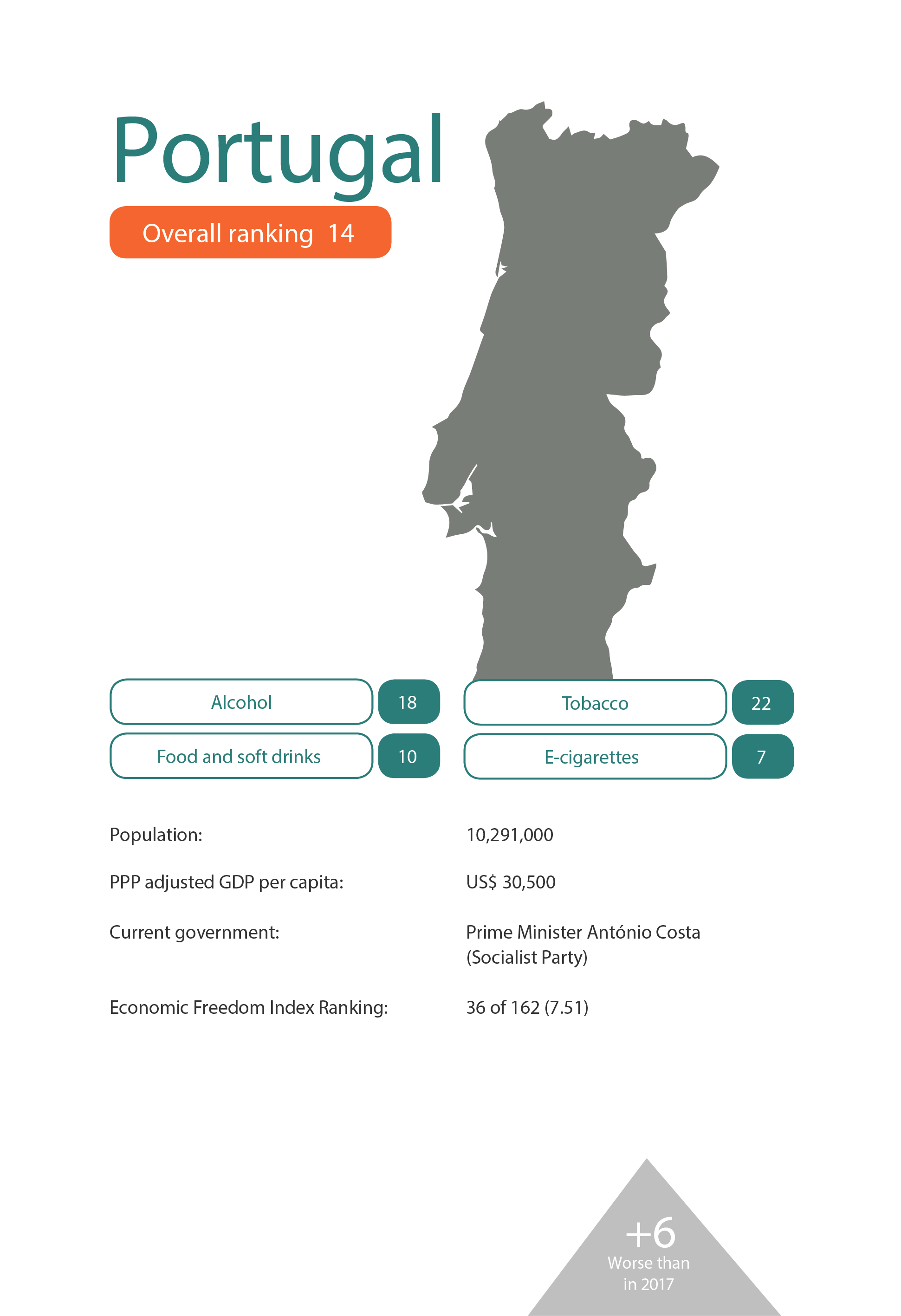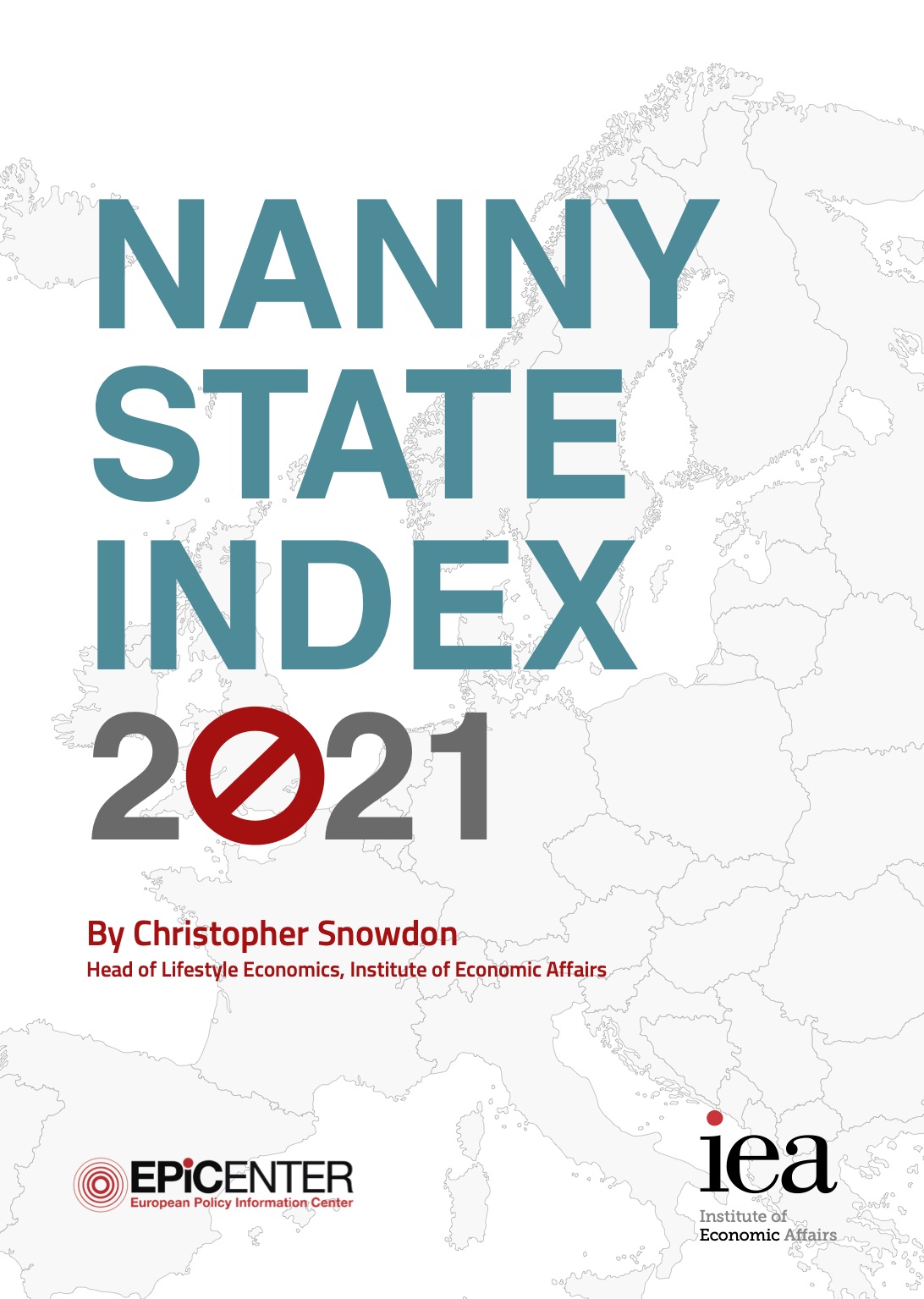
Portugal has performed quite well in previous editions of the Nanny State Index, but it seems to be on a gradual downward trajectory. Its socialist government hit consumers of soft drinks with a two-tiered sugar tax in 2017. Drinks with more than 8 grams of sugar per 100 ml are taxed at €0.16 per litre. Drinks with fewer than 8 grams pay a tax of €0.08 per litre. The government has also started interfering in the food supply. As of January 2019, there are legal limits on how much salt can be put into bread. The limit is 1.2 grams of salt per 100 grams of bread. This will be lowered to 1.2 grams of salt in 2019, 1.1 grams in 2020 and 1 gram in 2021.
By EU standards, Portugal’s smoking ban is mild but it is expected to get tougher by 2021. At the moment, it is generally forbidden to smoke in cafes, restaurants, bars and nightclubs of less than 100 square metres, but the owner may choose to provide separate smoking areas of up to 30 per cent of floor space, or in a physically separated smoking rooms of up to 40 per cent of floor space. Smoking is also illegal in places where children congregate, including outdoor spaces such as playgrounds. Smokers who flout the law can be fined up to €750 and establishments which permit illegal smoking can be fined up to €250,000.
Vapers have been clobbered by the nanny state in Portugal. Vaping is banned wherever smoking is banned and e-cigarette fluid is subject to a tax of €0.31 per millilitre, adding €3.10 to the price of a standard bottle. Although this was cut from €0.60 in January 2017, the tax is still one of the highest in Europe.
Life is better for drinkers. Alcohol can be sold in shops between 8.00am and midnight and there are no national restrictions on opening hours in bars and restaurants, although there has been a tendency towards greater regulation in some municipalities. Taxes on beer and spirits are about average for the EU and there is no wine duty. Alcohol can only be advertised on TV and radio after 10.30pm and sponsorship is heavily restricted.
Tobacco duty is set at a similar rate to that of other southern European countries but is the eighth highest in the EU after adjusting for income. Tobacco can only be promoted at point of sale but there is no display ban and no vending machine ban.
With thanks to Jorge Teixeira, Consumer Choice Center
About
The Nanny State Index (NSI) is a league table of the worst places in Europe to eat, drink, smoke and vape. The initiative was launched in March 2016 and was a media hit right across Europe. It is masterminded and led by IEA’s Christopher Snowdon with partners from all over Europe.
Enquiries: info@epicenternetwork.eu
Download Publication

Previous version: 2019
Categories
About the Editor
Christopher Snowdon is the head of Lifestyle Economics at the Institute of Economic Affairs. His research focuses on lifestyle freedoms, prohibition and policy-based evidence. He is a regular contributor to the Spectator, Telegraph and Spiked and often appears on TV and radio discussing social and economic issues.
Snowdon’s work encompasses a diverse range of topics including ‘sin taxes’, state funding of charities, happiness economics, ‘public health’ regulation, gambling and the black market. Recent publications include ‘Drinking, Fast and Slow’, ‘The Proof of the Pudding: Denmark’s Fat Tax Fiasco’, ‘A Safer Bet’, and ‘You Had One Job’. He is also the author of ‘Killjoys’ (2017), ‘Selfishness, Greed and Capitalism’ (2015), ‘The Art of Suppression’ (2011), ‘The Spirit Level Delusion’ (2010), ‘Velvet Glove, Iron Fist’ (2009).
Portugal 2019

Portugal has performed quite well in previous editions of the Nanny State Index, but it seems to be on a gradual downward trajectory. Its socialist government hit consumers of soft drinks with a two-tiered sugar tax in 2017. Drinks with more than 8 grams of sugar per 100 ml are taxed at €0.16 per litre. Drinks with fewer than 8 grams pay a tax of €0.08 per litre. The government has also started interfering in the food supply. As of January 2019, there are legal limits on how much salt can be put into bread. The limit is 1.2 grams of salt per 100 grams of bread. This will be lowered to 1.2 grams of salt in 2019, 1.1 grams in 2020 and 1 gram in 2021.
By EU standards, Portugal’s smoking ban is mild but it is expected to get tougher by 2021. At the moment, it is generally forbidden to smoke in cafes, restaurants, bars and nightclubs of less than 100 square metres, but the owner may choose to provide separate smoking areas of up to 30 per cent of floor space, or in a physically separated smoking rooms of up to 40 per cent of floor space. Smoking is also illegal in places where children congregate, including outdoor spaces such as playgrounds. Smokers who flout the law can be fined up to €750 and establishments which permit illegal smoking can be fined up to €250,000.
Vapers have been clobbered by the nanny state in Portugal. Vaping is banned wherever smoking is banned and e-cigarette fluid is subject to a tax of €0.31 per millilitre, adding €3.10 to the price of a standard bottle. Although this was cut from €0.60 in January 2017, the tax is still one of the highest in Europe.
Life is better for drinkers. Alcohol can be sold in shops between 8.00am and midnight and there are no national restrictions on opening hours in bars and restaurants, although there has been a tendency towards greater regulation in some municipalities. Taxes on beer and spirits are about average for the EU and there is no wine duty. Alcohol can only be advertised on TV and radio after 10.30pm and sponsorship is heavily restricted.
Tobacco duty is set at a similar rate to that of other southern European countries but is the eighth highest in the EU after adjusting for income. Tobacco can only be promoted at point of sale but there is no display ban and no vending machine ban.
With thanks to Jorge Teixeira, Consumer Choice Center

 Austria
Austria Belgium
Belgium Bulgaria
Bulgaria Croatia
Croatia Cyprus
Cyprus Czech Republic
Czech Republic Denmark
Denmark Estonia
Estonia Finland
Finland France
France Germany
Germany Greece
Greece Hungary
Hungary Ireland
Ireland Italy
Italy Latvia
Latvia Lithuania
Lithuania Luxembourg
Luxembourg Malta
Malta Netherlands
Netherlands Norway
Norway Poland
Poland Portugal
Portugal Romania
Romania Slovakia
Slovakia Slovenia
Slovenia Spain
Spain Sweden
Sweden Turkey
Turkey United Kingdom
United Kingdom
















